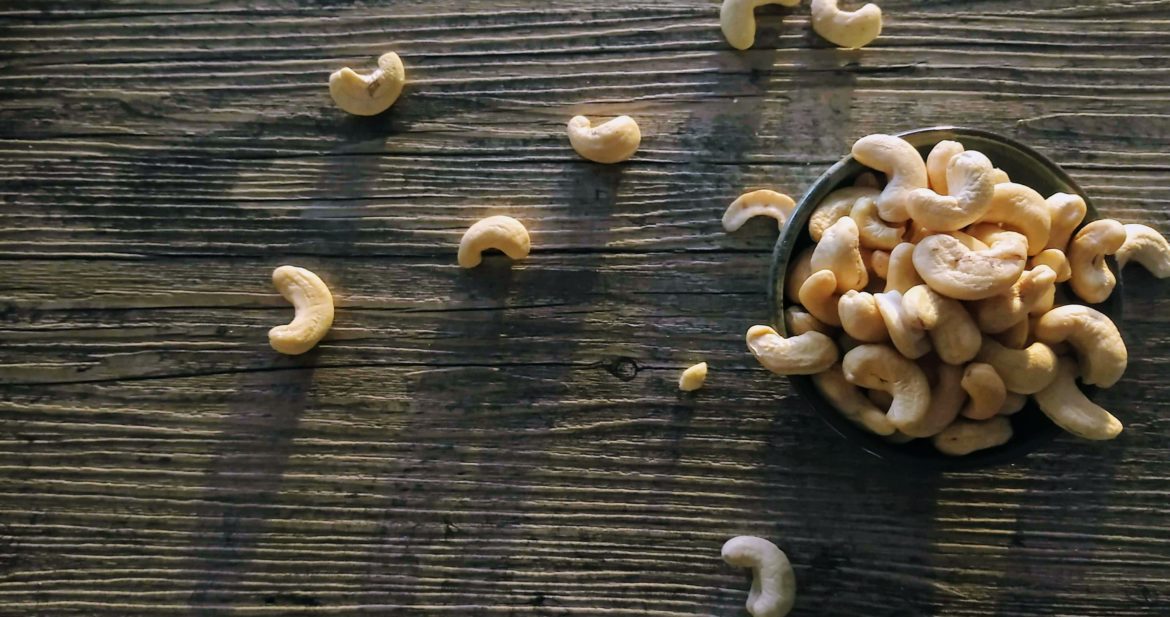A reader recently asked me this questions: ‘Can I substitute corn flakes for cashews in the recipe? I’m am worried about the calories in the cashews.’
This isn’t yes or no answer for me, mostly because there are health implications that come with it. First, to help you understand the substitution in the recipe that was in question, the cashews were ground and used as a coating … it’s a method that cornflakes have often been used for in the pat. Without testing it, I suppose this would work in this particular recipe.
However, I use the cashews because they are a much healthier choice.
I avoid products like corn flakes for a number of reason. Corn flakes are typically a GMO product (genetically modified organism) as corn is one of the most genetically modified crops in the United States. I understand everyone has their own feeling about GMO products (you can read more about them here and here), so today we’ll focus on the ingredients. Here’s what is in each:
Ingredients in corn flakes: Corn, sugar, malt flavoring, salt, BHT for freshness.
Ingredients in raw cashews: Cashews.
Carbohydrates turn to sugar.
The corn flakes are basically corn and sugar and sugar (malt is a hidden name for sugar) and a chemical that may or may not be a carcinogen and an endocrine disruptor (see note at the end of the post for more on BHT). Let’s not forget these crunchy flakes are highly processed.
The starches found in vegetables like corn are quickly digested and converted to the sugar glucose, which is then absorbed in the bloodstream. Because the body turns carbohydrates into glucose, eating carbohydrates makes blood sugar levels rise. Plenty of studies have linked sugar to weight gain, obesity.
Calories don’t count.
Seriously. If you’ve ever heard me give a presentation, this is something I’ve said over and over and over again. Sure, calories in vs calories out….I get the argument. But it’s more about TYPE of calories. Take 100 calories of apples vs 100 calories of doritos – do you think these are the same? Spoiler alert: they are not! The apple is in its original form (read: not processed), it’s filled with fiber, minerals and nutrients that the cells of our body needs to thrive. It’s NUTRIENT DENSE. Doritos are a fully processed food that doesn’t offer any benefits for the health of your cells and I would place corn flakes in this same corner.
When you eat a nutrient dense diet, you don’t have to count calories.
Fat doesn’t make us fat.
This might be one of the key points that so many of us who grew up in the 80’s have the hardest time understanding. We got the science on this wrong. The type of fat you eat is the key – avocados, oily fish, olive oil, ghee, seeds and nuts (like cashews) are the key. The body actually requires fats to run properly and lubricate the body. In the case of cashews, you also get a dose of protein, fiber, vitamins and antioxidant.
It’s important to note there’s a difference between simple, refined carbs (bread, pasta, flour, cookies, donuts, breakfast cereals) and complex carbs (vegetables, fruit, legumes) which come with fiber to slow down the sugar intake and a bevy of nutrients our body needs to thrive. It’s the simple, refined carbs that should be considered a once-in-a-while food; and when eaten, it’s important to balance with fat and protein to help stabilize your blood sugar.
So now back to the original question- can corn flakes be subbed for cashews….maybe, but you’re not doing any favors to your health if you do!
Have a question for us? Add a comment below and let us know what’s on your mind.
~Monique
What is BHT: From the Environmental Working Group-Butylated hydroxytoluene (BHT) is a chemical cousin to BHA that is also listed as “generally recognized as safe.” BHT is not a listed carcinogen, but some data have shown that it does cause cancer in animals. Rats fed BHT have developed lung and liver tumors (EFSA 2012). BHT has also been shown to cause developmental effects and thyroid changes in animals, suggesting that it may be able to disrupt endocrine signaling (EFSA 2012). A neurobehavioral study of rats exposed to BHT throughout development described effects on motor skills and coordination before the animals were weaned (Vorhees 1981b). What you should do: Read labels and avoid products with BHT, particularly those that also contain BHA.
1
